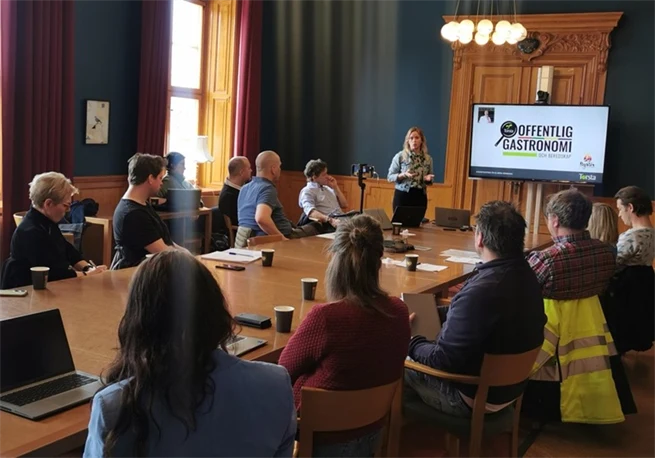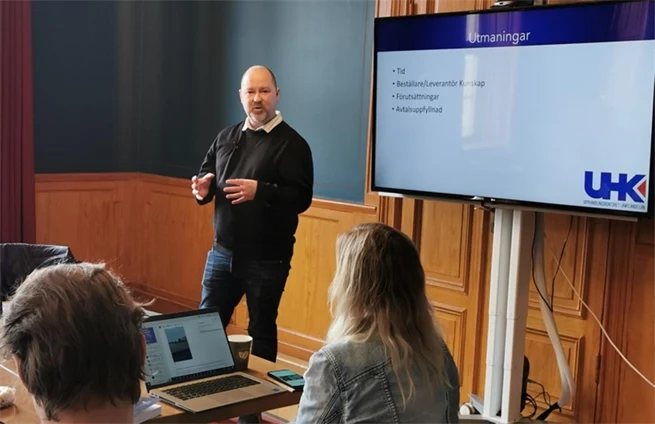Towards dynamic procurement of local food?
Food procurement was the theme of a workshop organised by the research project ‘Enhancing Entrepreneurship in Rural Areas through Local Food Systems’ on 20 March 2024 at Mid Sweden University in Östersund.
The workshop brought together a wide range of people from business, the public sector and academia, working with or researching small-scale food production, local food systems, entrepreneurship and rural development.
At the workshop, we heard a series of exciting presentations on sustainable food production, public gastronomy and the dynamic purchasing system, DIS. We also heard about the opportunities and challenges of food procurement under the Public Procurement Act, LOU.
The workshop was recorded and can be viewed here
Wilhelm Skoglund, Senior Lecturer at Mid Sweden University, welcomed us and presented the project ‘Enhancing Entrepreneurship in Rural Areas through Local Food Systems’. From the project we also heard about and discussed a survey on entrepreneurship in food production; a conversation led by Beate Stålsett, PhD student at Mid Sweden University.
The first invited speaker was Marie Sjölin, Rural Developer at Torsta AB. She talked about Torsta's mission, sustainable food production and public gastronomy. ‘Public Gastronomy and Preparedness’ is the name of a network that works to ensure that raw materials are given their due in the kitchens. A key element in this endeavour is to increase professional pride as well as knowledge and motivation in the kitchens. Working with food and meals as a whole, and communicating the added value of local produce, is also central to bringing about change.

Marie Sjölin, Rural Development Officer, Torsta AB.
Marie Sjölin also talked about Torsta's work with the dynamic purchasing system (DIS), focusing on marketing the tool to producers and showing the possibilities of the system. In a short film, we heard Maria Hildingsson from Bue Gård talk about her experiences with DIS. ‘From looking complicated at first, and feeling a bit formal, stiff and ‘procurement boring’, it was much easier after all the forms were filled in,’ she said:
‘After filling in those forms, then you're dealing with people. Then it's like any other sale. Then they call from the kitchen and say, do you have 10 kilos of mince for next Friday? Yes, I'll bring it over. It's no stranger than that.’
We then heard from Gustaf Danielsson, Head of the Procurement Office in Östersund Municipality, who talked about DIS and highlighted opportunities and challenges in food procurement. He explained that the idea for the dynamic purchasing system was born out of a desire to bring small businesses into procurement procedures and reach out to suppliers in Jämtland. DIS is also adapted to those who, for example, do not have the resources to deliver 12 months a year. The dynamic purchasing system is relatively new, and suppliers can sign up on an ongoing basis.
One challenge related to procurement, DIS and food is time: for suppliers to move from production to sitting at the computer. Another challenge is low knowledge among suppliers and buyers about what DIS means. Gustaf Danielsson and his colleagues are actively working to educate and explain DIS, in tender schools and webinars. The Procurement Office also communicates via LinkedIn, about new contracts, meetings, etc. https://www.linkedin.com/company/upphandlingskontoret/

Gustaf Danielsson, Head of the Procurement Office, Östersund Municipality.
Eva Lindahl-Toftegaard, University Lecturer in Law at Mid Sweden University, with a special focus on procurement, then talked about opportunities for food procurement within the framework of the Public Procurement Act, LOU. From a legal perspective, she talked about regulations, processes and requirements in food procurement, with a focus on small and medium-sized enterprises. Eva Lindahl-Toftegaard reminded us that three million meals are procured for health, school and care in Sweden every year. There are also political ambitions to increase the share of organic, sustainable and locally produced food. At the same time, from a legal perspective, we should avoid talking about local or locally produced, as EU law - which takes precedence over Swedish law - emphasises equal treatment of suppliers in a European market.

Eva Lindahl-Toftegaard, Lecturer in Law, Mid Sweden University.
Karin Ernehed, Rural Development Officer at Östersund Municipality, attended the workshop and found that it provided opportunities for collaboration above all:
‘It was great to sit at the same table as several different actors working with these issues, and get the chance to talk to others who also have a lot of thoughts about procurement, DIS and local food; actors that I don't usually meet around the same table - both producers and other organisations.’
Karin Ernehed
Magnus Larserud, Potato producer, Stocke farm, also participated in the workshop. He talked about the challenges he sees when it comes to food procurement, which is mainly about volumes, price and freight. Magnus Larserud also said that whether regulations and tools around procurement are favourable to food producers is closely linked to whether there is political will.
Magnus Larserud
Another workshop participant, Ing-Marie Jirhed, Project Manager Entrepreneurs at the Swedish Farmers' Union (LRF), also shared her thoughts on challenges when it comes to food procurement:
‘What I see as a challenge is that those who are going to procure food also see that it is a business opportunity for the county, and that we have a great development potential: that it can lead to more business in our county and the development of food production.’
Ing-Marie Jirhed
Johan Vikström, Potato producer, Grimnäs Potatoes, also participated in the workshop, and expressed that it has become easier with procurement. He sees a positive development where the Procurement Office and buyers have become more aware that they can pick out certain products and procure them separately:
‘And it will get better with the DIS management; that you can procure more small and supplier-adapted volumes and products.’
Johan Vikström
